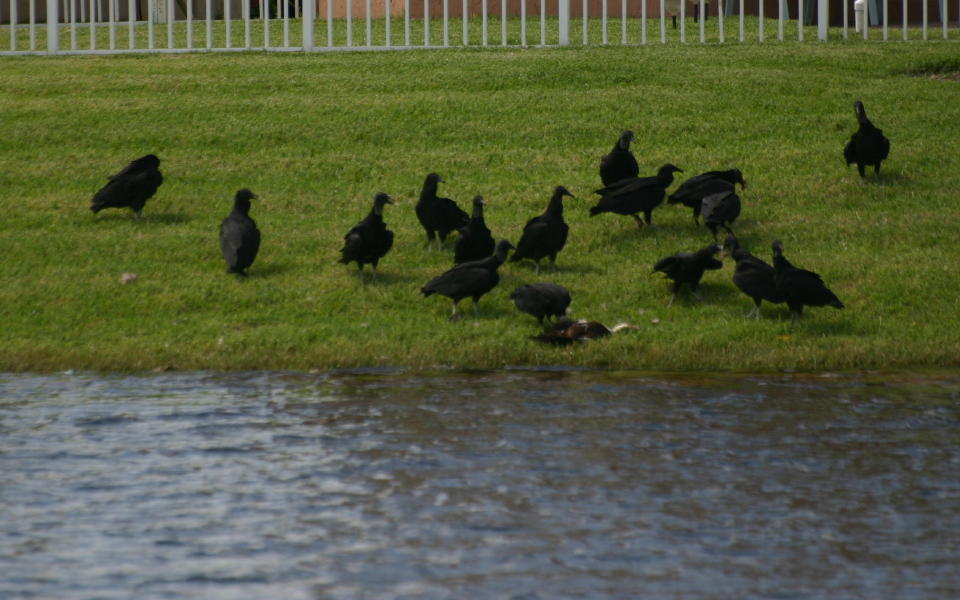
Yesterday morning I found a freshly dead adult White Ibis on our lawn, at the side of the lake. I did not think too much of it. However, a little later, diagonally across the lake, I saw a large group of Black Vultures congregating around the carcass of a freshly dead Muscovy duck. 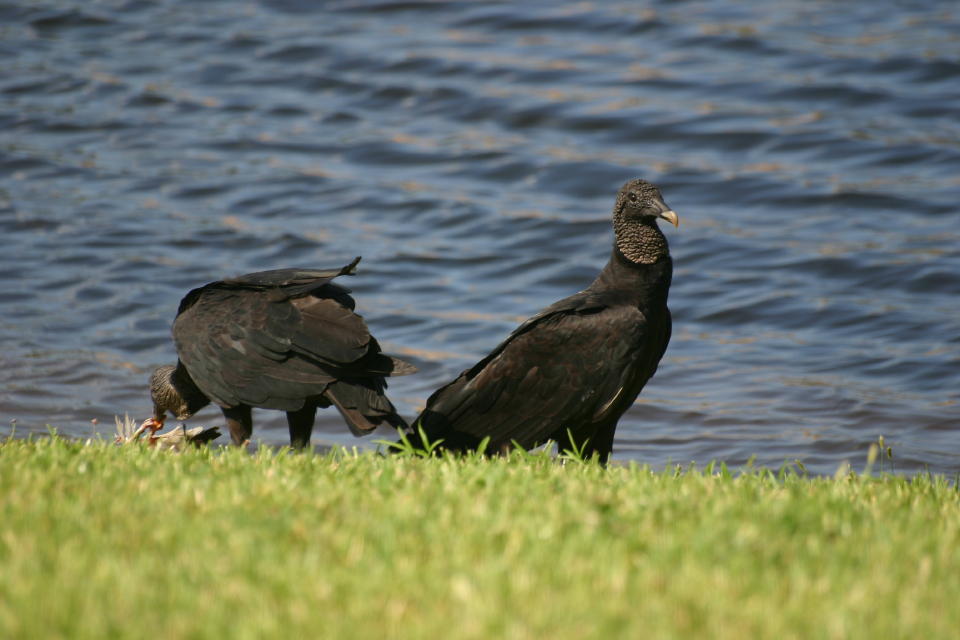
A couple of them came over and finished off the ibis, leaving barely enough for the flies.
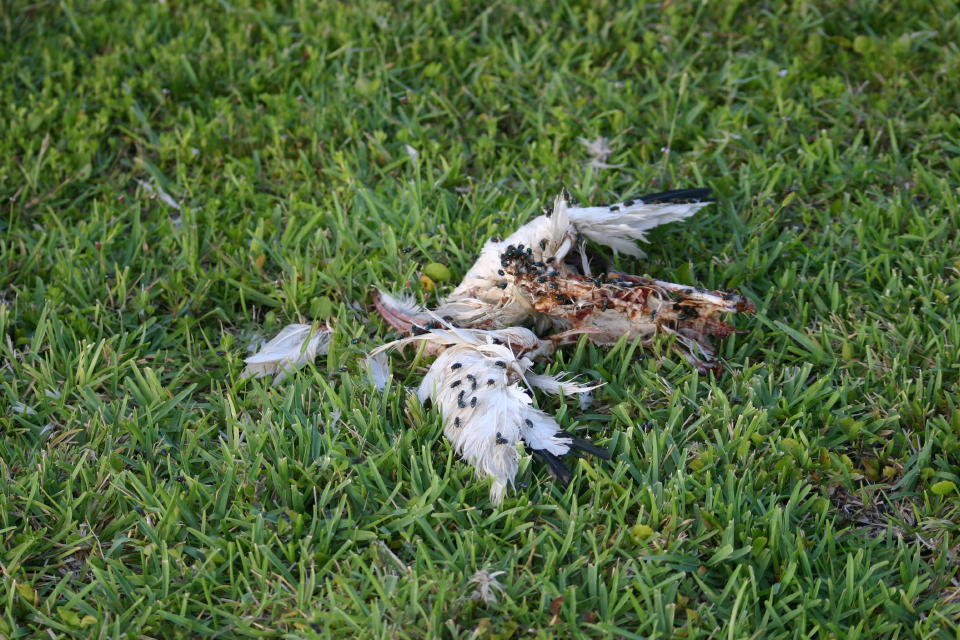
Then, later in the afternoon, a Turkey Vulture started making passes
over the yard next to the one where the first duck had died. It landed
briefly and approached another Muscovy that was sitting on the grass.
As the vulture drew near, the duck began moving toward the lake. It
could not walk normally. Rather, it flopped its wings clumsily and
pretty much crawled into the lake, where it began to thrash violently.
The vulture departed. The duck splashed about for several minutes, and
then fell silent at the water’s edge. Soon the Black Vultures were
feasting on its remains.
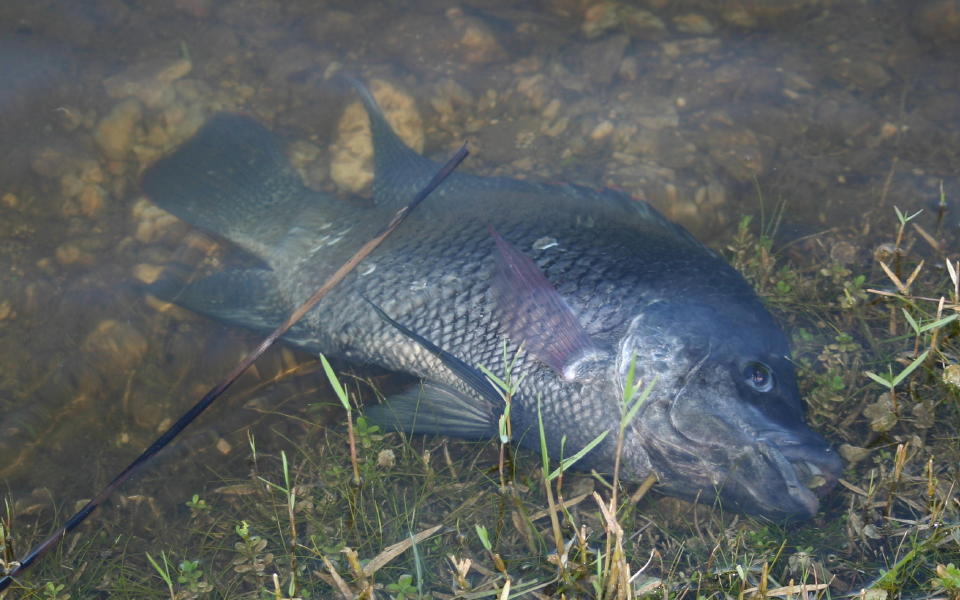
To my surprise, the vultures also moved along to join others that had found yet
another dead duck on the edge of the lake just to the south of our
property. I walked over towards them and found the body of this 16 inch fish, probably a Blue Tilapia, at the water’s edge. Not a good sign.
As dusk was approaching, I noted one of the two “sister” hens that had very similar coloring and facial patterns was out in the back yard, acting strangely. As I approached it, the bird appeared to have trouble balancing and holding its head up. It fell forward as it tried to walk away from me, its head dragging on the ground. It made it to the water, where it swam with its head submerged. Its “sister” swam close by.
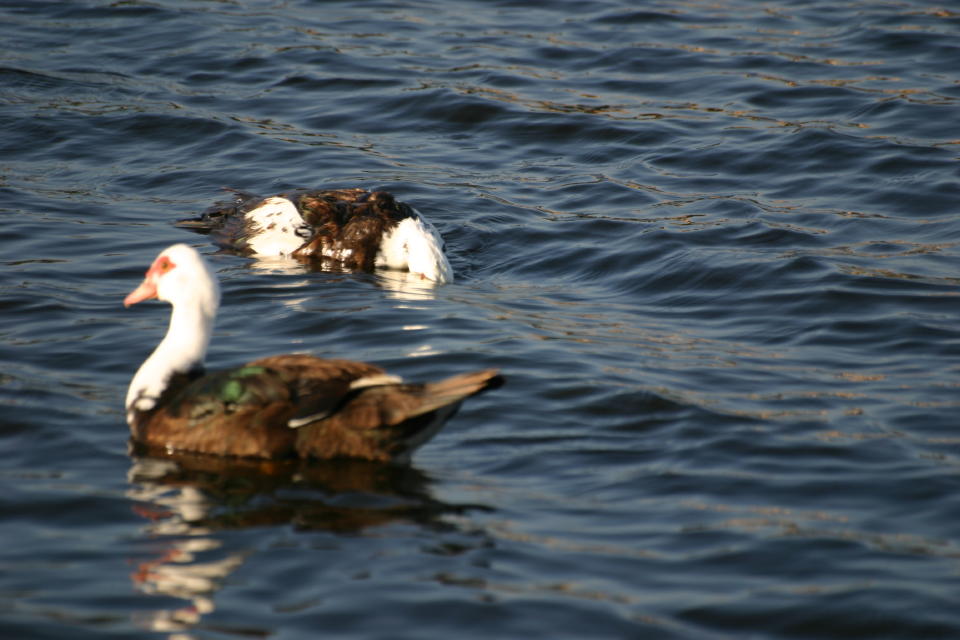
The sick duck tried to breathe every few seconds, flapping its wings to help it thrust its head above water as it gasped for air.
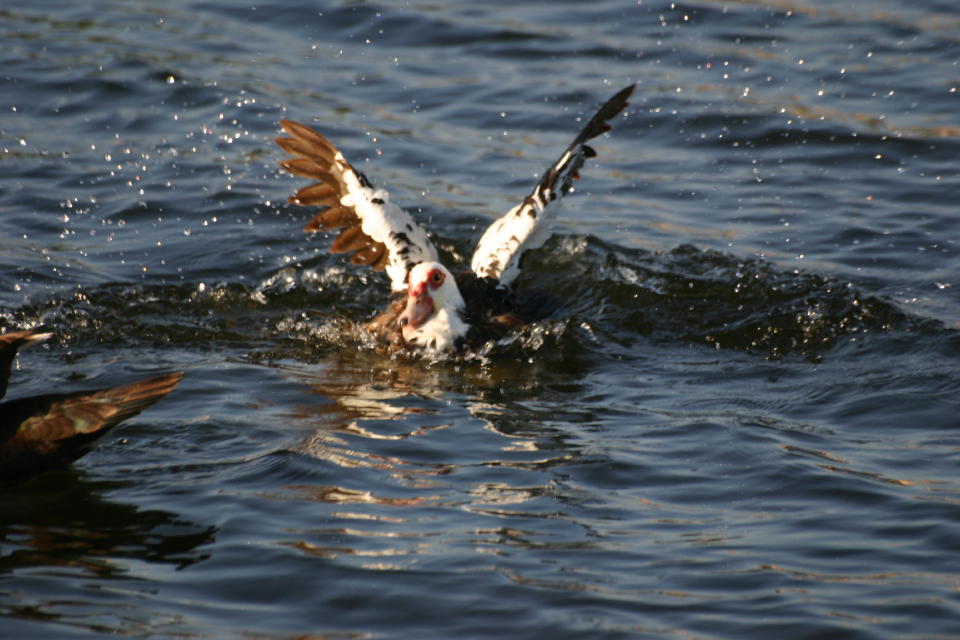
Finally, it made its way back next to the shoreline, where it rested its head on the lake’s edge, not moving. It was touching to see its “sister” staying close by as the bird expired.
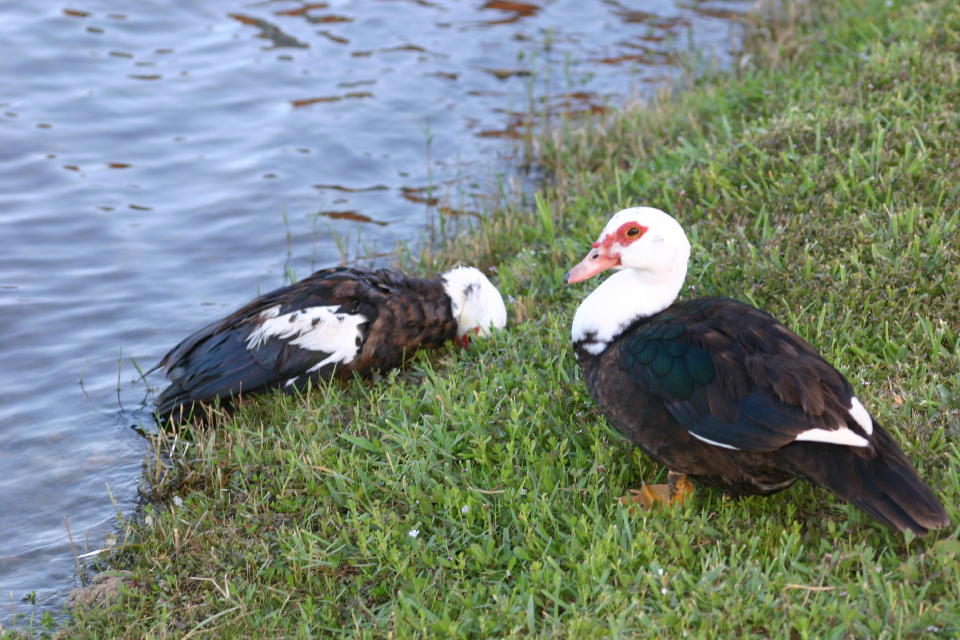
This morning, its body awaited the arrival of the vultures. Across the lake near where the first duck died, there was another body, of a mostly-white Muscovy. That adds up to 5 ducks, one ibis and a fish along a small stretch of shoreline, all dead within 24 hours. Also, perhaps an unrelated event, the brood of 12 ducklings that hatched out last week, pictured in my previous post, had disappeared by the next day
What can be killing these birds? Children sometimes throw rocks at the birds, but no signs of physical injury were evident. It appears to be a neurologic condition. The South Broward Drainage District regularly applies herbicides all along the lake’s edge, but they are said to be only mildly toxic (see this link). Pesticides, particularly organophosphates, are much more toxic to the brain, and they are often used rather indiscriminately, so they must be suspected. “Clinical signs in birds include goose stepping, ataxia, wing spasms, wing droop, dyspnea (difficulty in breathing), tenesmus (spasm of anal sphincter), diarrhea, salivation, lacrimation, ptosis (drooping) of the eyelids, and wing-beat convulsions.”
Then there are disease organisms that affect the central nervous system. West Nile may cause encephalitis, while bird flu would be most unlikely. If I see any more evidence of illness I will call health officials.







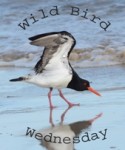





July 19th, 2007 at 10:53 am Botulism - call the health officials. There’s a pond in Rio Rancho at golf course where this was happening, as I recall the waterfowl exhibited similar symptoms.
July 19th, 2007 at 10:55 am Go here and look at Clinical signs. http://www.michigan.gov/dnr/0,1607,7-153-10370_12150_12220-26493–,00.html
July 19th, 2007 at 1:17 pm Paul, thank you for your observation. Just this morning, I saw a news report of a Type C botulism epidemic in waterfowl on Lake Ontario. The symptoms suffered by these birds do fit the picture. There was one more dead Muscovy on our lawn this afternoon. The vultures had already gotten to it, and not much flesh was left. They also were eating the large fish that I photographed yesterday. I wonder if the vultures might suffer toxic effects if it is indeed botulism that is killing the ducks. Pertinent passages from the article you cited: “Type C botulism - Type C botulism occurs principally in waterfowl and other birds living in an aquatic environment and causes tremendous losses, most notably in waterfowl in the western United States… “Type C toxin occurs in carcasses of dead invertebrates, in the flesh of birds dying of botulism, and in maggots feeding on toxic carcasses… “The only meaningful sign of botulism is the loss of strength due to muscular paralysis. The degree of paralysis is related to the dose and time of exposure and the amount of toxic material consumed. Gulls show wing-droop and difficulty in getting air-borne in mild intoxications. In more advanced cases, gulls are unable to stand, ducks are unable to hold up their heads.”
July 20th, 2007 at 3:25 pm Ken, I was also going to suggest Botulism. It happened at a local lake here. Some residence were not happy with the abundance of muscovy ducks and decided the best course of action was to take the eggs from the nests and throw them into the lake! Not a good plan. I would recommend calling your local health or environmental officials.
July 21st, 2007 at 7:34 am Hi, Janine– Thanks for the post. We have not seen any more dead birds, so this may have been a point source rather than a general phenomenon, whatever the cause. Ken
July 25th, 2007 at 8:43 pm On garbage collection days, the Muscovies and grackles attack any refuse that has been placed in open containers or flimsy bags, such as those from grocery stores. Once split open, the White Ibises join in the feast. There may be as many as 5 or 6 ibises and 4 or 5 Muscovy Ducks competing for anything edible. I wonder whether the brief but dramatic kill that I witnessed earlier this month was perhaps due to the presence of a toxin in someone’s garbage. If it were something in the lake, it should have affected many more birds. Having said that, I must note that a second brood of a dozen ducklings that hatched out in our back yard has also disappeared before they were two days old. Further, the number of ducks appears considerably less, though the tough old “Alpha” males are still around. However, there have been no more lakeside carcasses and the vultures seem to have gone elsewhere to feast.
December 2nd, 2007 at 6:30 am As a belated follow-up, the Muscovy die-off was much greater than the several carcasses on our property seemed to indicate. My estimate is that 80 to 90% of them perished, and only one brood of ducklings (maybe 4-5 individuals) has survived in the months since the kill. It very likely was a botulism outbreak, as Janine suggested earlier. Interestingly, this week we had a large numbers of fish die, attracting vultures and at least one Bald Eagle.